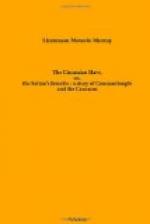The monarch bit his lip at the sarcasm of the remark, and as it, was expressed with no lack of bitterness, it could not but cut him keenly. Still preserving that calm self-possession which a full consciousness of his power imparted, he smiled instead of frowning upon her, and said:
“You are heated now; to-morrow, or perhaps the next day, you may come to me, and I trust that you will then be in a better humor than at present.”
Komel bowed coldly at the intimation, while her expression told how bitterly she felt towards him.
A dark frown came over the Sultan’s face at the same moment, and an accurate reader of physiognomy would have detected the fear expressed there that his violent purpose, as executed upon Aphiz, had failed totally of success.
Turning coldly away from him, the slave sought her own apartment in the gorgeous palace, to mourn in silence and alone over the fearful and bitter news she had just heard concerning one who was to her all in all, and who had taken with him her heart to the spirit land. The world, and all future time, looked to her like a blank, as though overspread by one heavy cloud, that obliterated entirely and forever the sight of that sun which had so long warmed her heart with its genial rays. As we have already said, Komel lacked not for tenderness of feeling. Her heart was gentle and susceptible; but dashing now the tears from her eyes, she assumed a forced calmness, and strove to reason with herself as she said, quietly, “We shall meet again in heaven!” Humming some wild air of her native land, the slave then tried to lose herself in some trifling occupation, that she might partially forget her sorrows.
Her flowers were not forgotten, nor her pet pigeons unattended. She wandered amid the fragrant divisions of the harem, and threw herself down by its bubbling jets and fountains as she had done before, but not thoughtlessly. The spirit of Aphiz seemed to her to be ever by her side, and she would talk to him as though he was actually present, in soft and tender whispers, and sing the songs of their native valley with low and witching cadence; and thus she was partially happy, for the soul is where it loves, rather than where it lives. From childhood she had been taught to believe the Swedenborgian doctrine, of the presence of the spirits of those who have gone before us to the better land; and she deemed, as we have said, that Aphiz Adegah was ever by her side, listening to her, and sympathizing with all she did and said.
It is a happy faith, that the disembodied spirits of those whom we have loved and respected here are still, though invisible, watching over us with tender solicitude. Such a realization must be chastening in its influence, for who would do an unworthy deed, believing his every act visible to those eyes that he had delighted to please on earth? And yet, could we but realize it, there is always one eye, the Infinite and Supreme One, ever upon us, and should we not be equally sensitive in our doings beneath his ever present being?




